In the modern anime sphere, getting a complete story, start to finish, is a rare thing. As is getting an adaptation for an older work. Dororo however has, through the grace of Twin Engine, managed to get both of these. Based on the 1967 manga of the same name by legendary Mangaka Osamu Tezuka, Dororo takes the viewer back to a time before tropes were commonplace. Predating Berserk by almost 20 years, with many of the same themes. A story much darker than what fit’s is original art style and time period, it truly is a series out of time. But how does this story, canceled after only 4 volumes with largely anime original content, fare in the modern anime sphere? Well, let’s dive in and find out. As always, spoilers after this point.
Let’s go!
(Disclaimer: I am working to make 50 the new “average”. 70 is not an average score people. 70 is above average. Carry on.)
Animation/Art
Starting off, the most obvious, how does Dororo look? Personally, I enjoyed the style decent bit. Dororo does a lot with it’s thin lines and muted color palette. Waiting for the moment of maximum effect before it bathes you in light and color. Making important scenes standout from the rest. Outside of these scenes, Dororo takes a very natural approach to color. With numerous greens and browns for its landscape and environment. Occasionally this can be rather dull, as it all bleeds together into a drab scene. Or during some flashbacks where everything is forced into a muted grey-scale. But for the most part, I find Dororo to have generally appealing stills and style. Allowing one to take at least one shot from each episode as a background for your PC or something. No, the issue’s don’t come up until Dororo starts to move.
In motion, Dororo is a series of reasonable highs and abysmal lows. The series is at it’s best whenever Tahomaru and Hyakkimaru are on screen together. Really pulling out all the stops for any of their confrontations, or the occasional demon. However, outside of these rare confrontations, Dororo’s animation is just not appealing. In particular the feet and hands are just blobs, and the complex designs on outfits and such often lead to issues. However, the big issues don’t begin until the 2nd cour. After a fantastic mid-season finale, Dororo just… falls apart. Even managing to produce an episode on par with Gurren Lagann’s infamous Episode 4, made by the same director, Osamu Kobayashi. To put it simply, I hope this man never touches an episode of a series I like ever again. Because Dororo never truly recovered after he got his hand’s on it.
Direction
As far as Direction goes, scene composition, imagery and all of that, I think Dororo did quite well. On more than one occasion, the framing of a scene saved it from whatever animation or art issue it might have had. With numerous scenes that, already looking good, were elevated by the framing of it all. Take the image above, which could have been a simple sunset. Yet Director of Photography Yoshihisa Ooyama helped make it so much more. Framing the sun in the center, all the tree’s bowing or leaning away from it, illuminating the battlefield. Because of its more natural color palette of greens and browns, when Dororo throws in these splashes of color, it often does a whole lot. Lighting and giving the scene a whole new meaning. It’s not perfect of course, but it is very pretty.
I have a few issues with Dororo’s visual style, excluding the animation. The first is the heavy reliance on flashbacks. These were novel initially. The grey-scale combined with the singular bursts of color. Whether it be the blue from the flower, or red from the fire, they drew the attention and were interesting. Eventually though Dororo was throwing so many of them at us I began to find it a bit exhausting. The other issue I have is Dororo’s occasional over reliance on filters. This is really a case by case basis, and I am sure what I point out here might not match up for some. However, occasionally Dororo would just totally blow out a scene with the lighting or bloom filter. Forcing everything into a weird sort of heavy contrast. Occasionally it worked, occasionally it didn’t. In spite of this though, I am overall content with Dororo here.
Story/World
Now though we can get on to the meat of the series, Dororo’s story. As a whole, I quite enjoy it, the concept is fresh for it’s time. You can see it’s influence on works to come after it, such as Berserk I believe, as well. The premise of Hyakkimaru having lost his body, and having to effectively destroy a land and its people to retrieve it, is solid. As are the themes explored of “one life for many”, “human greed”, “dependency” and “family”. Dororo has a lot on its plate and for the most part, I think it tackles them all well. Neither side is ever presented as singularly right or wrong, generally leaving it up to the viewer to decide. And more than once the Demons hunted are shown to be more than bland evil monsters. However, where Dororo stumbles is in it’s execution of this solid premise.
For me, the biggest issue Dororo faces is that it meanders. In the first cour, this was fine. Everything was getting established, characters were introduced and stakes were set. However after a terrific mid-season finale, where battle lines are drawn and family drama is initiated Dororo just… goes back to meandering episodically? The demons hunted in the second half could have been tied much closer to the core family drama. Meanwhile Daigo’s family could have used much more screen-time to better establish their struggles and position. As it is, Dororo returns to an episodic format that only makes sense if it still had the original manga’s 48 demon count. As it is, all tension just drops off a cliff, not to be seen for another 8 episodes. It’s a terrible shame, and a terrible waste of an otherwise solid premise. At least Mio’s story happened before Dororo fell apart.
Characters
Luckily for Dororo, it’s roster of characters help carry it through this rough patch. Most of the leads were, at the very least, decent. With the likes of Tahomaru, Hyakkimaru and Mio being standout stars of the series for me. The two brothers play off of each other very well, both being different extremes of the same issue. Using violence to solve their problems, one believing himself selfless, the other just wanting what he believes is his. Both being incomplete, suffering from different but similar issues in their upbringing, basically growing up without parental love. That Dororo chose to focus on them was fantastic, and really carried the series whenever the two were clashing. Physically or morally. Mio I also enjoyed, as her story was perhaps the best, most well contained single arc in the series for me. Mio set Hyakkimaru’s descent in motion, and it was my favorite tragedy in a long time.
However, once you leave this core set of characters, Dororo starts to falter a bit. Daigo felt very hollow, as we didn’t get to see near enough of him. His story closed out well, but only because of how it fit into Hyakkimaru’s, and not through his own merit. Meanwhile, Nui and Junkai suffer similar fates. Both are still better than Daigo of course, but both also seem to exist just to die tragically at the end. Which doesn’t mesh well with the overall “happy” ending of Dororo. The biggest offender of it all though, for me, are the side characters. Because of Dororo’s meandering, there are so many stories and side characters that only exist for 2-3 episodes at most. Never to be heard from or seen again. It’s a lot of fat that could have been cut in my opinion.
Ending
Finally, the ending. Oof the ending. Perhaps the most conflicted I have felt about this show across it’s run. Part of it, involving the brothers Tahomaru and Hyakkimaru, was great. Their fight across the castle was well animated and they stayed true to their characters until the end. Hyakkimaru’s confrontation of Daigo was well done as well, giving an underrepresented character a good ending. However, everything after that just felt to… happy? Convenient? Dororo has had tragedy after tragedy throughout it’s run until this point, yet at the very end, it goes for the happy ending. Using a time-skip to jump over any grief or new experience’s of Hyakkimaru. Cutting straight to an ambiguous future with Dororo herself. It was as if it was rushing through everything to finish up. Lightly touching on everything that needed more time to cool before closing out.
Part of this ties back into Nui and Junkai, who feel rather shoehorned in. Their existence at the end makes sense, they are the two characters who Hyakkimaru has been conflicted about in the past. Loving them both as his “mother”, they along with Dororo are the reason he remains human at all. Yet, they seemingly appeared at the precise location they were needed out of nowhere, just to die. The entire burning castle around them, yet there is not urgency, they just… sit there and accept it. Oh sure, it made for some great screen-caps and was a pretty ending. But it just didn’t feel… right. I suppose my main issue with the ending all ties back into this: It’s to happy. I was hoping for, expecting, a greater tragedy than what we got. You can read more specific thoughts on the ending here, if you so choose.
Conclusion
So, all in all, how was Dororo? Personally, I believe it to be worth your time. It’s not perfect, the middle 10-12 episodes are a bit of a slog to get through at times. A lot of the series’ potential got lost in the episodic demon killing, without any clear path forward for the plot. With many of these episodic stories not connecting up as well as they needed to. However, what is there is unique. It’s a story from another time in Manga, before a lot of modern tropes took hold. Dororo is like a look into the past for anime, with all the flaws and blemishes that accompany the era. If you’re looking for something different, you could do much worse than Dororo.

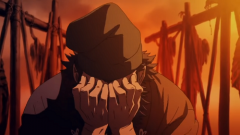
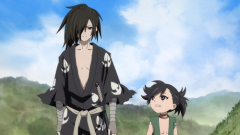
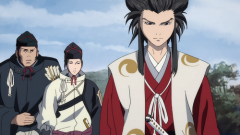
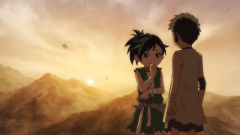
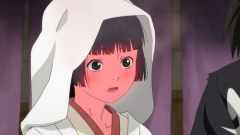
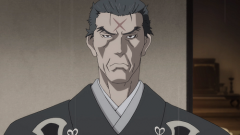


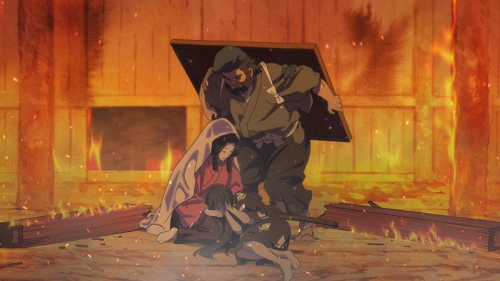

I pretty much agree with your thoughts on Dororo so let me just comment on the 50/70 average thing.
It kinda depends on how you conceptualize your own rating system, but how I see it having an average score above 50 is reasonable. As a 50 would be an average anime out of all anime. Something just average is pretty boring and wouldn’t really evoke strong feelings either way. Since most people will pick and choose what to watch based on their taste or positive reviews and such, rather than watching things at random YOUR average anime should be something you enjoy more than the average anime in general. People actively try to watch things they’ll like which would skew their average. A 65 is likely what I would give Dororo.
And about your utter distaste for Osamu Kobayashi, while I won’t argue the lack of polish in his art or animation, I really liked 3 of his 4 series where he was in the directors seat. Beck, Paradise Kiss and Mahoutsukai ni Taisetsu na Koto: Natsu no Sora. None of which had stellar art/animation. But I feel like his style really worked for them. Though it’s hard to say how much credit I can give to his directing it at least never got in the way of me loving those shows.
There is an argument to be made for the 50/70 rating scale thing, for sure. If an individual’s rating score is around a 70, I don’t mind that. Most people (myself included) tend to drop things that would score low. So they never really get factored in, and the average trends up. Makes perfect sense, and I don’t knock it.
Part of it is my personal rebellion against the idea that “Anything below a 70 sucks” or “70 is average across the board”, which you see in game reviews a lot, and in the American Education system at large. With 70 being the minimum “passing grade”. So I can’t cross out any bias on how that may effect a score.
For your Dororo score, I can see 65. You like Kobayashi more than I do, and I have a rather sour view of the middle like… 8 episodes. Personally, I could understand a score +- 10 points from where I put it, entirely on how individual aspects appealed to people.
For Osamu, I would not be surprised if his works he is in complete control over work better. They would have his consistent style from the beginning and be a lot more cohesive. My issue with him comes when he tries to force his style into other shows for a single episode that he directs. Such as Dororo or Gurren Lagann. He has no intention of matching the existing series at all, which makes the entire thing look out of place.
Personally my main issue with numerical scores in general is that they don’t really tell me anything more than that “this person liked this show better than this show” assuming both reviews was done with the same standards and without having a change of taste over time.
There are so many different interpretations for scores for different people that you still need to read the actual review to understand what the score means, and even then you can have multiple people reading it and each thinking it should have had a different score just based on what is written in the review.
In simpler terms, just that part in the conclusion about the show being worth watching despite it’s flaws says more than the score. =)
Yeah, reading I feel is always worth more. I include the score in the title mostly because its how its done for reviewing/blogging. Its something quick and snappy to latch onto. If I thought I could get away with it, I would save the score until the end, to try and push people to read before they set some preconceived notion based on a score.
I am glad you liked it! I write it for those like you two.
I think scores are still valuable, especially to get a sense of the reviewers overall ranking. Problems arise when people only look at the number or apply their own system of ranking onto everyone else. Just the review alone can be kind of vague on exactly where the show stands in the reviewers eyes and how it would rank against other shows. Contrast is key in establishing a foundation on which to view things. If someone gives one show a 5 and another a 9 you can be sure they liked the 9 a hell of a lot more. But it really comes into play with small 1 point differences where the content of the review would make it difficult to discern a ranking. And people like their rankings, top 10 lists can attest.
Sorry about carrying on this score/averages thing so much :p
The thing is, what are you looking for in entertainment? Not something boringly average I’d guess. While something below a 70 might still have something to offer, how much time and or money are you willing to invest into that level of quality? There’s something to be said for gaining perspective and contrast from consuming works across the spectrum of course. But in general you would want to invest yourself mainly in thing of high enough quality to be worth your investment. Which is where the 70 baseline comes in.
The education system through high school and even some post secondary has a 50% passing grade though, right? Though some courses have a 70%, doesn’t it make sense that medical or electrical etc professionals should have better than a 50% grasp of their material?
I see where you’re coming from with the consistency. I would definitely be interested in hearing your thoughts on Beck or Paradise Kiss if you got around to watching them. Kobayashi also directed Beck’s awesome OP.
To do this and your other comment as one response:
I don’t mind the score talk, I like the feedback. Means you care enough to let me know.
Like I said, its a fair point to be made. Do you try and change the system (Baseline 70), or do you try to accurately rank something within the established system to more accurately get information across? It’s something I actually struggle with every time I score one of these, and lately in the past year or so, I have resolved to try and stick to my guns a bit and see what kind of reception it receives. If nothing else, people are clearly talking about it.
😛
One more point of confusion with regards to “average” though is that it brings up the whole question if we are talking about it being average out of all animes produced?, for example 49-50% animes being better and 49-50% animes being worse, or if we are talking about something being average in terms of it’s own potential quality?
Those two usages of the word don’t necessarily align.
In any case the main thing really is that you stay consistent with your own scoring, and looking back on your past reviews you probably have been going with this for a while.
Paradise Kiss was great. Too bad they bailed on giving us a full fashion show at the end, which brought the conclusion down several notches for me.
I know right?! I was disappointed too. At least it had a solid conclusion unlike a certain other Yazawai Ai work… Nana ending when?! Who am I kidding, at this point probably never 🙁
I don’t really love this show either, but I can’t help but see the whole rating adjustment thing as further indication that this site is just falling farther into more obnoxious and derivatively snobbish reviewing.
Psgels used to be fun to read! What happened??
Different strokes for different folks I suppose. I find it helpful to look at things objectively. Even if I enjoy a show, I can do so and still call a piece flawed. I quite enjoyed Dororo’s beginning and ending for example, however I can’t just waive the middle 8 episodes under the rug. I’m not trying to be snobby about it, I love Shounen for goodness sakes, I would make a terrible snob. Just… reasonable, I suppose is the word I would use.
Luckily, thats why we have other authors! I hope Mario, Wooper or either of our 2 newbies is more your speed. I’ll see if I can’t tone down the snob a bit and still focus on what I want to focus on though. See if I can’t improve for ya. Vinland next season might be just that, because I love that manga, and I fully expect to love that show.
Don’t ever go soft like RandomC tends to do. Call out the bullshit when you see it. Playing nice in reviews can be incredibly annoying when something deserves a good bashing. Psgels reviews were heavily skewed towards the higher end, but he wasn’t afraid to be harsh on things either.
No need to adjust things, bud. You’re the one doing the work here, so we should adapt to you. I myself wouldn’t keep coming back if I didn’t find the reviews overwhelmingly thoughtful and well-crafted.
Comment section: 60/100
I appreciate that. Thanks for stickin around.
I think you’re confusing reviewing with scoring. The final verdict in this review is, “So, all in all, how was Dororo? Personally, I believe it to be worth your time.” What’s obnoxious or snobbish about that?
55/100? I’ll have to seriously disagree there. There were problems here, true, but nothing deserving of calling it “average” by the metrics of modern anime. If anything its the opposite.
To me, this was the most refreshing anime of 2019. The current state of anime, even the good ones, are riddled with trite-y tropes shoehorned in by suits/editors for sales (or merch). It reminded me a whole lot of unfiltered creative vision of Avatar the Last Airbender (a masterpiece of an animated tv show). More anime could do with drawing that comparison.
Secondly, it provided us an authentic take on the consequentialist mindset of rulers, and the suffering of the common people during the Warring States era- an era which is overly romanticised in anime as some golden period for adventure and culture.
You mention Berserk, but even Muira says he cannot see himself giving Berserk a tragic ending because the journey itself has been the tragedy. Dororo, is a tragic story. I thought the ending to be perfect.
Hyakkimaru was robbed of the chance to live and grow up as a normal human. He was born, properly, upon regaining his body only to immediately lose his mother and the man who raised him. It was not happy by any stretch of the word. If anything it was hopeful. Hope that he would discover his purpose as a human. Hope that he would reconnect with Dororo. Hope, that his true birth would free him from blood he spilled on the journey to regain what was rightfully his.
And a birth, especially one after such a long tumultuous pregnancy, by human instinctual design is a beacon of hope if nothing else.
I think story wise its very refreshing, I agree. If I were to rate it purely on it’s story, it would be much higher. But holistically, I took into account the myriad of production issues that occured along the way. It also, narratively, had a lot of holes. I can enjoy something, I feel, and still find it refreshing while acknowledging its faults. (Avatar is a fantastic btw).
For Berserk, I have no idea where you got that quote. I consider myself a rather big fan of Berserk, and the closest I can think of that you are referencing is an old interview (https://mangabrog.wordpress.com/2015/12/14/berserk-artist-kentaro-miura-interview-i-actually-dont-think-i-could-let-such-a-long-grim-story-end-with-a-grim-ending/) where he states he doesn’t think he could have a grim ending. But that doesn’t mean a tragic or happy ending. Possible translation issues of course, but from what I know, its up in the air. Assuming it ever ends, of course.
Besides my disagreement wasn’t that Hyakki didn’t die. He should live on. I just found it rushed into the happiness to quickly. There wasn’t enough time to really go over what had transpired in the end. We go from the castle and such to a hinted happy ending after a 2 year timeskip. I think Dororo could have benefited from giving us more time to see how this ending affects our characters.
Its also just that personally, I prefer tragedies. I enjoy tragic endings. Its just my cup of tea. Even if the score doesn’t agree with you however, I hope the individual points raised do. The production issues are obvious, the ending is rushed, Daigo is underused and the middle section really is meandering and pointless, in my opinion.
While we disagree though, I appreciate you takin the time to read and let me know your thoughts. I like these being a discussion and I admit I had some trepidation about this score because I knew a good number of people enjoyed it. But I wanna stay true to how I feel about it, and this is it.
I agree with everything you said here. Good job.